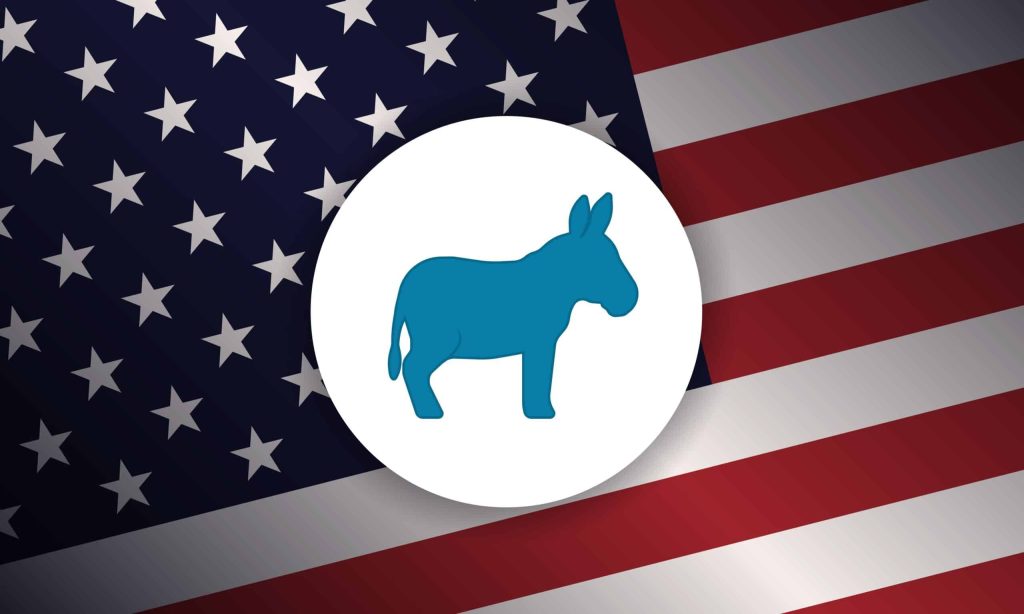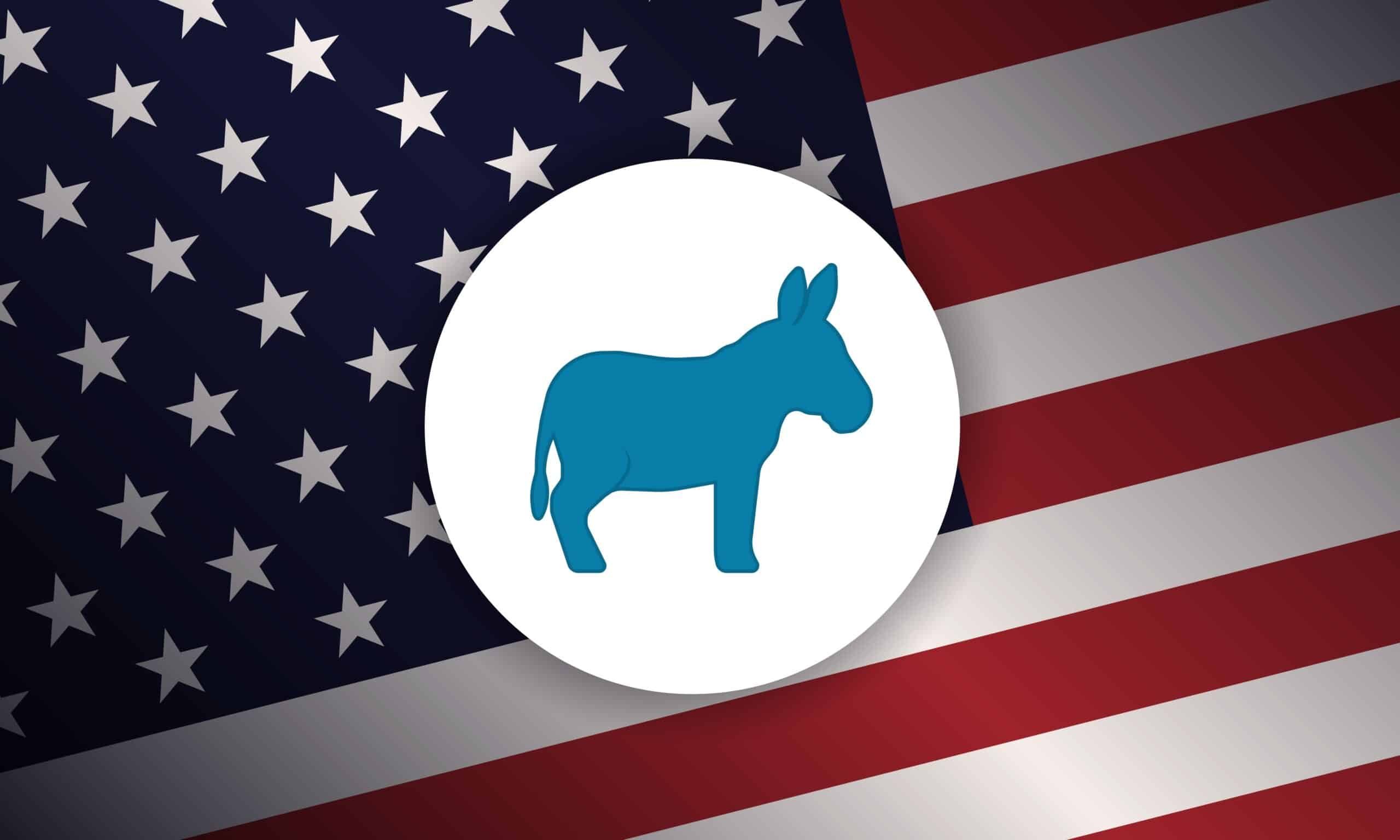
Democrats missed a crucial chance to shape a clear and balanced framework that could protect consumers while still fostering robust innovation in the US.

The crucial question now is whether Democrats can adapt to meet the crypto moment, or remain on the sidelines as the industry evolves.
(Shutterstock)
Posted November 8, 2024 at 3:01 pm EST.
In the wake of the 2024 election, the crypto industry has emerged as a powerful political force. With a GOP-controlled presidency, Senate (as I write, control of the House is still at issue), and a conservative-majority Supreme Court, the crypto industry has played a pivotal role in shifting power. While the initial reaction may be celebratory within crypto circles, there’s a deeper lesson—one that highlights a critical failure within the Democratic Party.
For years, crypto advocates have called (even begged) for regulatory clarity. Industry leaders organized policy discussions, hosted fly-ins, walked through “open doors” at the Securities and Exchange Commission (SEC) and urged lawmakers publicly and privately to engage on both sides of the aisle.
The general thought, one that I have always held, is that although financial resources are inherently political, in the case of crypto, they are not inherently partisan. Yet, Democrats dismissed these efforts, often framing digital assets as scams or vehicles for crime. By failing to recognize the broad economic potential of blockchain and digital assets as bitcoin, Democrats missed a chance to shape a clear and balanced framework that could protect consumers while fostering robust innovation here in the United States.
Read more: From Pariah to Power Player: Crypto’s Political Triumph
This inexplicable hesitation left a deep and vacuous political void, now filled by a tsunami of financial support for mostly MAGA candidates (and smaller pool of pro-crypto Democrats) who promised a pro crypto innovation environment. Now, under a GOP government, the industry stands on the verge of sweeping change—championed by Trump and supported by a Congress poised to function in lockstep. Proposals like FIT21, which could shift oversight of crypto from the SEC to the Commodity Futures Trading Commission (CFTC), signify a regulatory shake-up that’s both eagerly anticipated by the crypto industry, and also fraught with unanswered questions regarding unintended consequences.
Democrats’ miscalculation has immediate impacts that stretch beyond the crypto sector, affecting the broader balance of power and protections of other essential Constitutional freedoms like bodily autonomy. Project 2025—a hyper conservative blueprint that aims to consolidate executive power and dismantle regulatory frameworks—is set to advance swiftly and comprehensively under GOP leadership, threatening fundamental freedoms in ways that extend well beyond crypto.
The promise of digital assets as tools for economic empowerment is jeopardized, especially for communities that saw crypto as an unencumbered path to bypass systemic financial barriers but will fare far less well under a MAGA-empowered agenda.
The Impact on Black Americans
For Black Americans, the stakes are especially high. Crypto has offered a new route to financial independence unencumbered by traditional gatekeeping intermediaries, appealing to those distrustful of government and traditionally sidelined by conventional finance. Black investors represent a growing demographic in crypto, with studies showing 23% of Black respondents own cryptocurrency, compared to only 17% of white Americans. Yet Project 2025’s vision for centralization and restrictive social policies could undermine the freedoms these same communities seek.
With Trump back in office and a crypto-friendly Congress, financial regulations are expected to loosen or at least come into view—a reality both promising and needed, but one that comes with a host of externalities. While industry insiders celebrate potential regulatory relief, the broader implications for everyday investors and innovators, who are far more diverse than industry C-suites and boards, remain murky. The rapid rise of crypto-backed Super PACs like Fairshake in this election illustrates the power of corporate donations in influencing policy—a phenomenon that risks drowning out voices from communities that depend on crypto for financial empowerment.
Read more: Elizabeth Warren Will Be the Top Democrat on the Senate Banking Committee
The Democrats’ failure to engage meaningfully on crypto has also forfeited a valuable opportunity for financial inclusion. Studies by Paradigm and Ariel/Schwab show that Black Americans are more likely to view crypto as an entry point to investing, a chance to bypass the racial wealth gap. But by aligning with a GOP agenda that prioritizes deregulation, crypto risks sacrificing its potential as a democratizing tool and instead becoming entangled in a vision of governance that could undercut the freedoms it promises.
The crypto industry has never operated in a vacuum. Its advocates must recognize that financial empowerment cannot be separated from other fundamental rights. As Agenda 47—Trump’s scaled-down version of Project 2025—takes shape, the communities that over-index in crypto ownership and innovation face an uncertain future. While there’s been much celebration in crypto circles over Trump’s victory, the long-term impact on those who helped power this shift remains unknown.
For Democrats, the lesson is stark: ignoring innovation and dismissing transformative economic paradigms comes with steep consequences. The pressing question is whether the party will adapt to meet the crypto moment, or remain on the sidelines as the industry evolves beyond its influence.
In the end, the Democrats’ entrenched anti-crypto stance has exacted a price—not just for the party, but for the Republic as a whole. Now, the true test lies with the crypto industry itself. Will it rise above self-interest to fulfill its promise of inclusion and empowerment, or will it become the poster child for a neo-financial order that consolidates power rather than disrupts it, ultimately replicating the very inequities it claimed to upend?
These are questions that desperately need answers.
Dr. Tonya M. Evans is a professor at Penn State Dickinson Law and an advisor on fintech education, policy, and legal matters through Advantage Evans, LLC. She serves on the Board of Directors at Digital Currency Group (DCG), contributing to strategy in digital assets and blockchain, and is the host of Tech Intersect, a weekly podcast on technology and law. Dr. Evans holds modest amounts of BTC and ETH as part of her commitment to understanding the digital economy.







